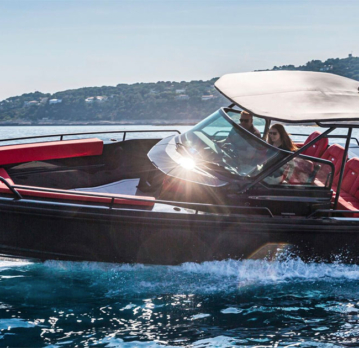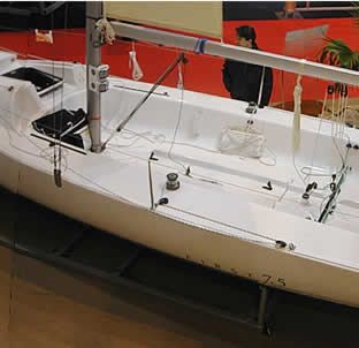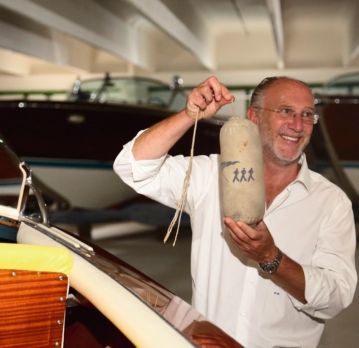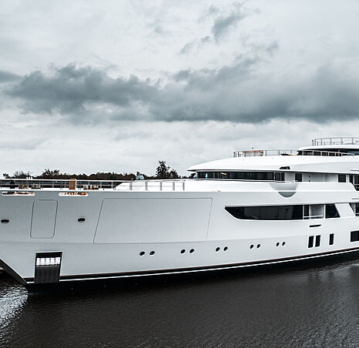
Diesel or petrol? The eternal dispute, which resolves as soon as delve into the theory and crunch the numbers total cost
Choosing a diesel or gasoline engine, you need to know not only the size and type of vessel, but also how, where, why, and with what intensity it will be used.
It’s simple: if you have a fast planing boat up to 35 feet — you definitely need gas. If you have a large displacement or a planing yacht, the more interesting option would be a diesel.
To each his own
If your choice fell on a small planing boat, where weight is relevant, the gasoline engine is by far the most logical pick.

It is easy and rapid and, therefore, is geared for speed and maneuverability. If such a boat is to install a diesel engine, it will be possible to go on it no further 2000-3000 rpm without the possibility to go to the airboat and to develop at least some decent speed. This particular sin Europeans who prance particularly nowhere and there is no reason — on the sea a small boat, the wave is not cut, and on the lakes not the scale and distance to accelerate. They do not need the maximum speed, they have other problems. It’s like a Mercedes s-class with three-liter diesel engine: beautifully, status, but is very economical and leisurely. You can, of course, to be original and put something like a Volvo Penta D11 to nine meters. Planing it is, of course, the boat throw, and even develop a decent speed. Only its weight and dimensions in excess of gasoline with the same characteristics twice, it’ll be too serious ballast for light vessels. In the absence of any logic, originality becomes stupid and a waste of money. So for owners of small planing boats, radeyuschie for speed, a matter of choice has no development. Definitely petrol.
But then there are nuances and personal preferences.

Any displacement vessel it makes sense to put a diesel unless you’re looking for speed and go into the season not less than 200 hours.
A planing boat over 36 feet in length will also be glad of a diesel engine. Its weight and dimensions allow to take on Board a budget heavyweight.
The cost
As we all know, diesel engine is much more expensive than petrol. Maintenance, replaceable parts, even the work of the mechanics — all prices much higher. And in Russia, where the price of diesel fuel equal to the price of gasoline (and sometimes exceeds it when compared with ‘ 92), it is necessary first to calculate that the savings are really “economical”. If the boat goes a lot and often, then a diesel engine will beat its cost. For the occasional pleasure cruise when rolling forward in a season not to exceed 200 hours, diesel will be a more profitable option, even in spite of his good appetite.
Durability
Perpetual motion has not yet been invented. But if you do not run diesel unit and time to maintain it, it will last two times longer than similar petrol. Extreme durability and reliability is a large and powerful ship engines. Or at least modernized tractor — with thick-walled parts for wear which will need not one thousand hours.

In the pursuit of speed and the desire to lose weight manufacturers reduce the thickness of parts of diesel engines. But it is especially important that the block and the cylinder head was thick-walled. A huge amount of heat energy generated inside the cylinder, very hot components, and if the wall thickness is insufficient, due to the large voltage occurs, the deformation of parts: crankshaft, bearings, pistons and cylinder wall are changing their geometric form. They begin to not function correctly with large loads, and sooner fail. Therefore, conversion of automotive engines in the sea is rarely successful. In any case, these engines serve on the ships is much shorter than on cars, for which they were designed.
A very important point — the lack of downtime in the operation. Do not assume that a small number of hours completed by the engine, is an indicator of his large unused resource. While the boat remains motionless, parts of the engine suffer from corrosion, deteriorate, warp, that significantly shortens the lifespan of the entire unit. Of course, there are times when after a long idle the engine plant without sneeze, but this is the exception rather than the rule. Regularly the engine will last longer.
If we are talking about light diesel convertible from the car, their properties do not match with a heavy tractor and marine motors. High-powered, ideal for cars and roads, working at constant load and water resistance, without the transmission, they do not stand the blame on their task. As a result, overheated the motor and washed the oil film from the cylinder walls. Car engine should be fully adapt to new challenges, constant load, and that’s not all do and not everyone can. The automobile segment is widespread in the twenty-first century, while the outboard direction is only gaining momentum.
Habitat
It is important to understand where you will operate your boat.

Why Europeans are so fond of diesel engines? Yes, because they take these engines for a long time, treat them with the utmost attention and care and service in a specialized service that they have at every village there. Diesel they are always high quality and much cheaper than gasoline. Therefore, the engine is long, and the difference in the price of fuel and economical consumption time to recoup the high cost of the motor itself.
No doubt in the choice of engine for semi-displacement boats have in those regions where diesel is difficult to buy (like in Venice), or where it’s too cold. In the Baltic States, for example, go to the last, and in the cold, as you know, the diesel having at times difficult.
In Russia, if you go only within his yacht club and the neighbouring coast, with the dressing, as a rule, the issue is resolved. Even if the canister is still there, who and where to carry. But then it is immediately clear that the route your narrow-minded, and forward under the end of the season — clearly not something to brag about. In this case, your choice — gasoline.
But for those who like to make a route, travelers in search of adventure and avid fisherman, occasionally seeking to know where the fuel tank bottom, diesel may be more reliable companion. Walking in the sea areas like Sochi, where gasoline on water freely available at all, is also better to stop the choice on diesel fuel.
In addition to refills, I have it in the tractor and never refuse barges. It can be poured directly from the Board. Besides, diesel is less explosive, so to smoke on the Board next to the canister is not a crime. Most importantly, remember that if you are using plastic containers, let it be specialized cans for petroleum products. Otherwise the solution in the plastic diesel can send your engine to the nearest authorized service.
Also diesel is good for frequent overnight stays on the water, in which the most widely used generator. The exhaust gas of a gasoline engine is a gas of carbon monoxide and pleasant it is not enough. Waste diesel contain a small percentage WITH and not hazardous to health. Although the presence of sulfur dioxide may cause mild headache, even without consequences.
Fuel quality
Gasoline, as you know, on the Russian open spaces it is possible to find very diverse: sometimes quality is similar to tea brewed in three cups with one bag.

For the engine no joy a quality gasoline will not make it and pochihali and howl, and the speed will be taken. But to work—. So you will be able to reach a good speaker. Max — we’ll have candles to blow out and drain the water. It’s not very good, but not as critical as it is for diesel. Mixed with water in diesel will cause the engine to shut up and you to strain yourself on the way to the Studio, where you will have to overhaul fuel equipment. To avoid unpleasant moments, ideally you need to get a separator, a filter with the sump and a sensor at the water. And in very severe cases, when rescued tractor or a motor vessel and in the tank splashing something strange muddy color, it is better to give the fuel to stand for at least a few hours: the top layer in the tank that is left — pour. “Settle” can and on the easy course, the process of decomposition is faster due to vibration.
The operation of the engine
No gasoline engine won’t be happy if you need to haul large, heavy cargo: because of the hard work it will produce a lot of heat, which will quickly lead to distortion of parts, and therefore to rapid wear of the engine. Diesel, in turn, hates maximum speed: operating at the limit, parts are subjected to increased load and, therefore, much faster fail. Ideally an engine should run at 80% of its capacity, that is, to accelerate the boat up to cruising speed, no more. High-speed engines live on less. It is a fact from which there is no escape. If petrol representative is 900 hours before overhaul, the diesel can count on for 1500 hours or more. Diesel engines, that the ship or a converted tractor, not a converted car, have engine life and reliability compared to any modern diesel. But they are different. Almost eternal diesels the ratio of displacement-to-power is committed to the value of 1:2. That is the engine of 650 cubic inches will last indefinitely with a power of 370 HP, but quickly “die” with a capacity of 600 HP, We will get a heavily boosted motor with a short lifespan, during which he will often beg for a date with an expensive mechanic.
But don’t rely only on the number of covered hours. If the engine with an “infinite” resource is idle and very occasionally (less than once a week) to walk along the shore, hours to roll it a little, but corrosion during idle time will ruin the life of the internal components of the motor and lead to wear of all systems much earlier than planned. So diesel tractor you need to drive like a horse — constantly, to avoid stagnation. And, of course, in time to serve, and stood without moving in the first place. Then it will be a long time and will not fail at the right time.
Summary.

It is important to find a task that you set for your boat. And pick up the engine, taking into account all the nuances of dimensions, weight, goals and expectations.
For large and heavy semi-displacement boats, pleasure for a season not less than 250 hours, diesel will be a good choice and will justify the hopes rested upon it.
For speed and ease, for infrequent trips to a planing boat gasoline engine will be the right and best decision.
But whatever you choose, the most important factor in the end is your attitude. Timely, high-quality service, care and attention — and your engine will go for a long time and like clockwork.
gasolineideas













What do you think?